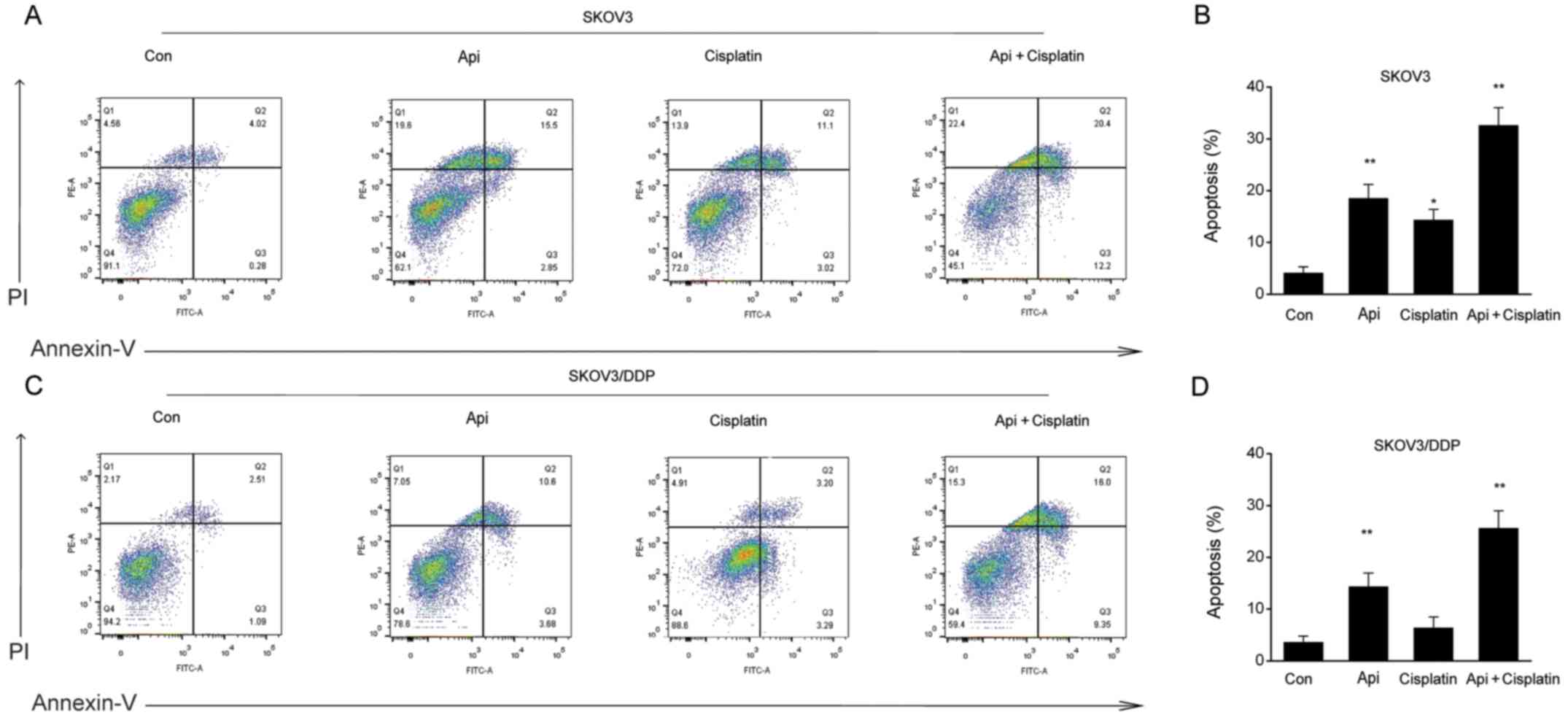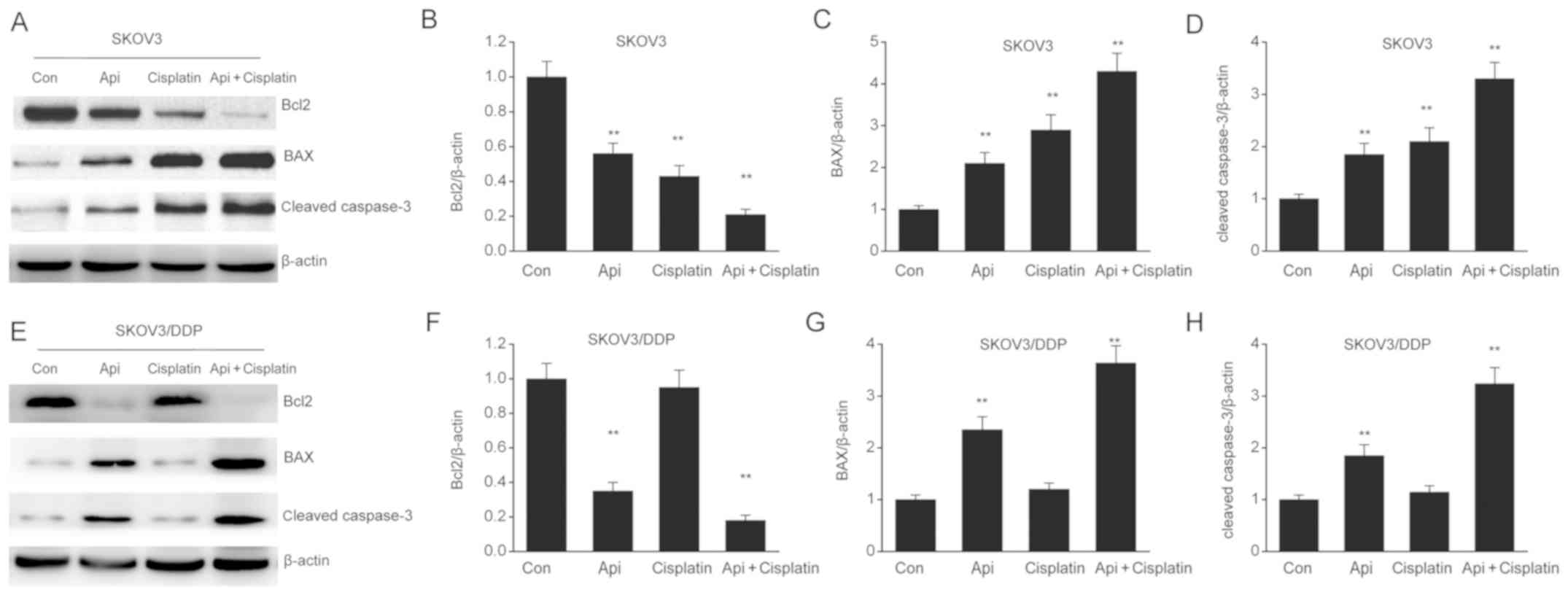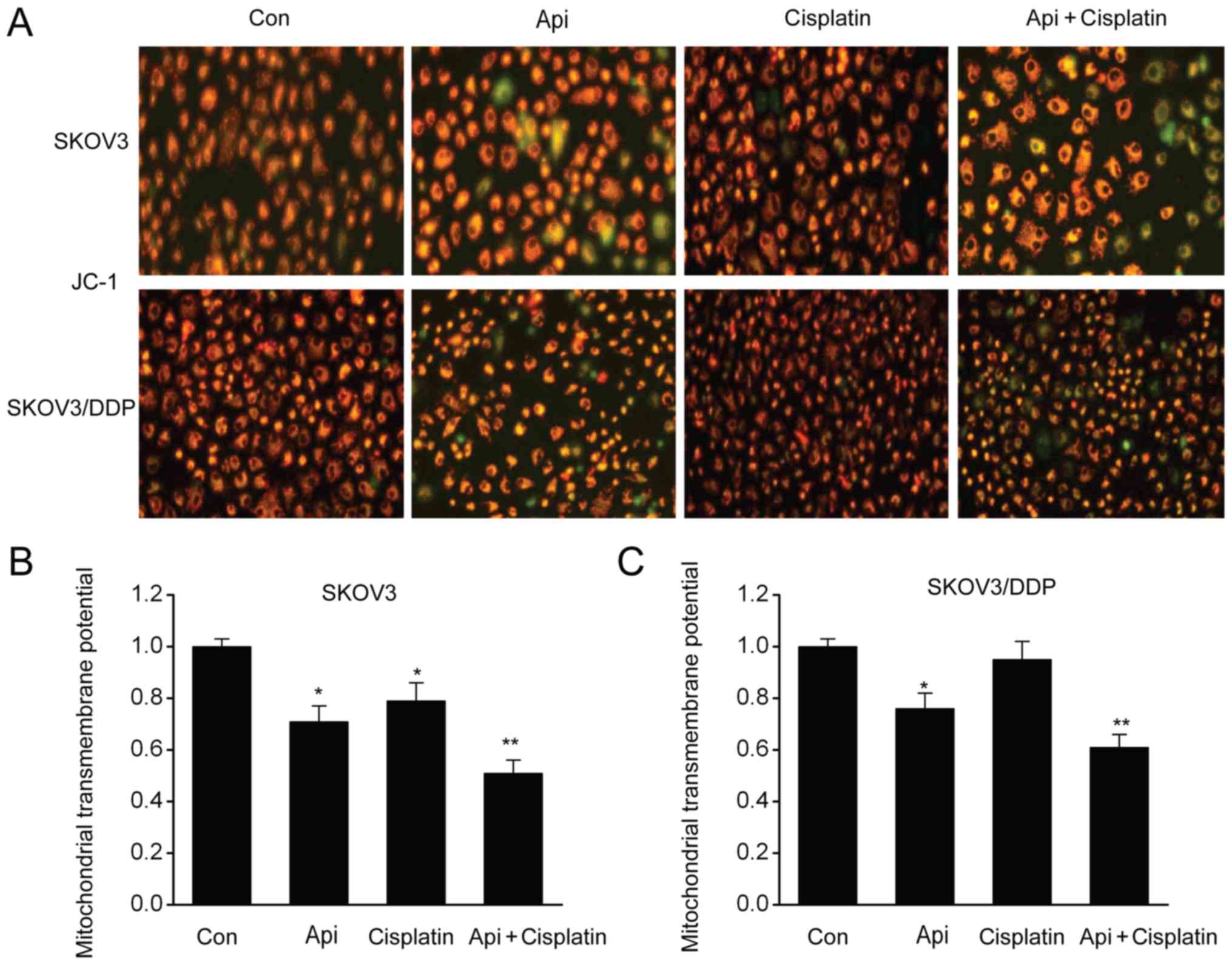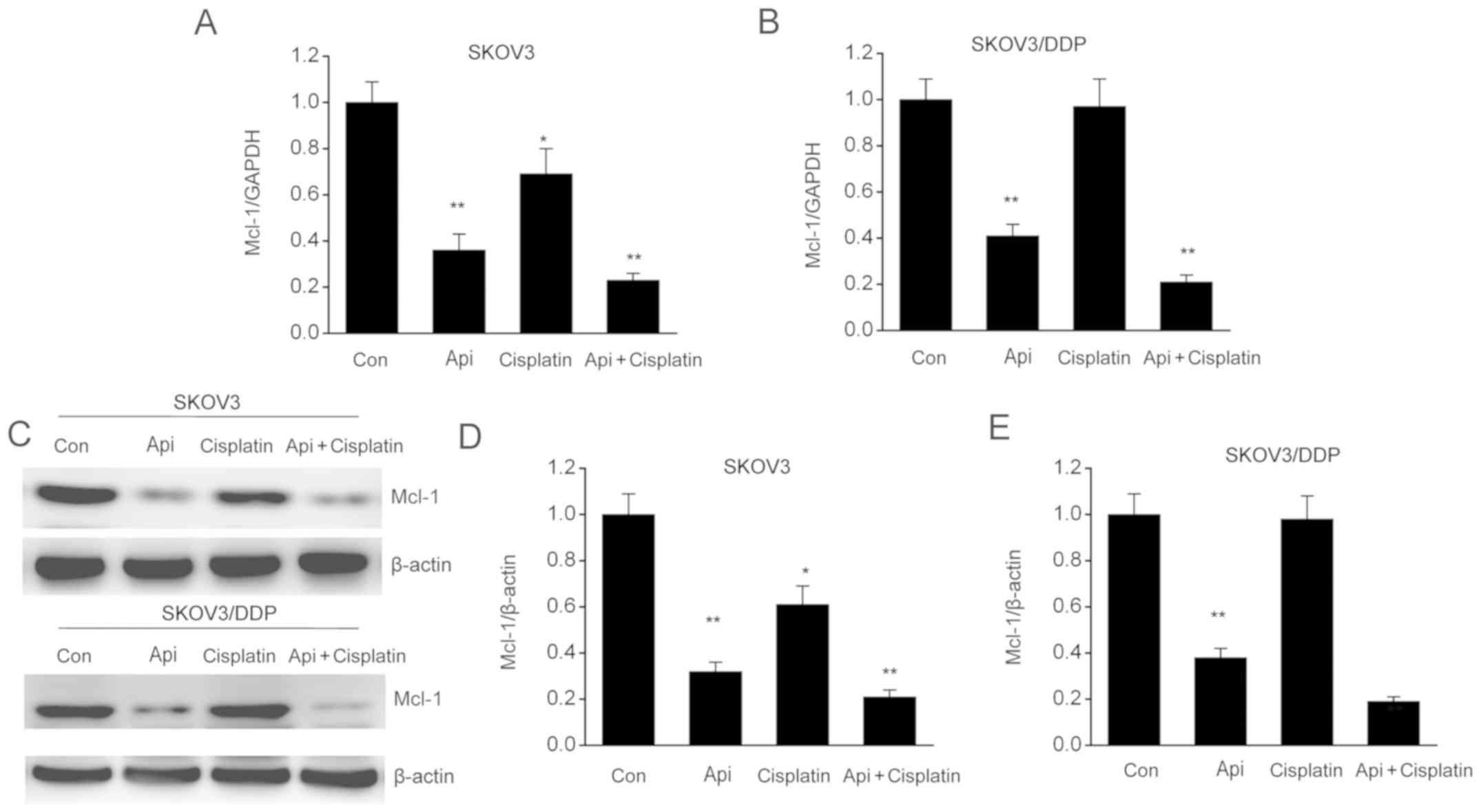|
1
|
Enroth S, Berggrund M, Lycke M, Lundberg
M, Assarsson E, Olovsson M, Stålberg K, Sundfeldt K and Gyllensten
U: A two-step strategy for identification of plasma protein
biomarkers for endometrial and ovarian cancer. Clin Proteomics.
15(38)2018.PubMed/NCBI View Article : Google Scholar
|
|
2
|
Zhou L, Xu X, Liu H, Hu X, Zhang W, Ye M
and Zhu X: Prognosis analysis of histone deacetylases mRNA
expression in ovarian cancer patients. J Cancer. 9:4547–4555.
2018.PubMed/NCBI View Article : Google Scholar
|
|
3
|
Park SJ, Kim J, Kim SN, Lee EJ, Oh S, Seol
A, Lee N, Chang SJ and Kim HS: Practice patterns of surgery for
advanced ovarian cancer: Analysis from international surveys. Jpn J
Clin Oncol. 49:137–145. 2018.PubMed/NCBI View Article : Google Scholar
|
|
4
|
Yousefi H, Momeny M, Ghaffari SH,
Parsanejad N, Poursheikhani A, Javadikooshesh S, Zarrinrad G,
Esmaeili F, Alishahi Z, Sabourinejad Z, et al: IL 6/IL 6R pathway
is a therapeutic target in chemoresistant ovarian cancer. Tumori.
105:84–91. 2019.PubMed/NCBI View Article : Google Scholar
|
|
5
|
Momeny M, Eyvani H, Barghi F, Ghaffari SH,
Javadikooshesh S, Hassanvand Jamadi R, Esmaeili F, Alishahi Z,
Zaghal A, Bashash D, et al: Inhibition of bromodomain and
extraterminal domain reduces growth and invasive characteristics of
chemoresistant ovarian carcinoma cells. Anticancer Drugs.
29:1011–1020. 2018.PubMed/NCBI View Article : Google Scholar
|
|
6
|
Ahmed N, Escalona R, Leung D, Chan E and
Kannourakis G: Tumour microenvironment and metabolic plasticity in
cancer and cancer stem cells: Perspectives on metabolic and immune
regulatory signatures in chemoresistant ovarian cancer stem cells.
Semin Cancer Biol. 53:265–281. 2018.PubMed/NCBI View Article : Google Scholar
|
|
7
|
Ozbey U, Attar R, Romero MA, Alhewairini
SS, Afshar B, Sabitaliyevich UY, Hanna-Wakim L, Ozcelik B and
Farooqi AA: Apigenin as an effective anticancer natural product:
Spotlight on TRAIL, WNT/β-catenin, JAK-STAT pathways, and
microRNAs. J Cell Biochem. (Oct 2)2018.PubMed/NCBI View Article : Google Scholar : (Epub ahead of
print).
|
|
8
|
Perez-Moral N, Saha S, Philo M, Hart DJ,
Winterbone MS, Hollands WJ, Spurr M, Bows J, van der Velpen V,
Kroon PA, et al: Comparative bio-accessibility, bioavailability and
bioequivalence of quercetin, apigenin, glucoraphanin and
carotenoids from freeze-dried vegetables incorporated into a baked
snack versus minimally processed vegetables: Evidence from in vitro
models and a human bioavailability study. J Funct Foods.
48:410–419. 2018. View Article : Google Scholar
|
|
9
|
Wang Y, Xu Z, Huang Y, Wen X, Wu Y, Zhao Y
and Ni Y: Extraction, purification, and hydrolysis behavior of
apigenin-7-O-glucoside from chrysanthemum morifolium tea.
Molecules. 23(23)2018.PubMed/NCBI View Article : Google Scholar
|
|
10
|
Hong J, Fristiohady A, Nguyen CH,
Milovanovic D, Huttary N, Krieger S, Hong J, Geleff S, Birner P,
Jäger W, et al: Apigenin and luteolin attenuate the breaching of
MDA-MB231 breast cancer spheroids through the lymph endothelial
barrier in vitro. Front Pharmacol. 9(220)2018.PubMed/NCBI View Article : Google Scholar
|
|
11
|
Maeda Y, Takahashi H, Nakai N, Yanagita T,
Ando N, Okubo T, Saito K, Shiga K, Hirokawa T, Hara M, et al:
Apigenin induces apoptosis by suppressing Bcl-xl and Mcl-1
simultaneously via signal transducer and activator of transcription
3 signaling in colon cancer. Int J Oncol. 52:1661–1673.
2018.PubMed/NCBI View Article : Google Scholar
|
|
12
|
Vrhovac Madunić I, Madunić J, Antunović M,
Paraždik M, Garaj-Vrhovac V, Breljak D, Marijanović I and Gajski G:
Apigenin, a dietary flavonoid, induces apoptosis, DNA damage, and
oxidative stress in human breast cancer MCF-7 and MDA MB-231 cells.
Naunyn Schmiedebergs Arch Pharmacol. 391:537–550. 2018.PubMed/NCBI View Article : Google Scholar
|
|
13
|
Sun Q, Lu NN and Feng L: Apigetrin
inhibits gastric cancer progression through inducing apoptosis and
regulating ROS-modulated STAT3/JAK2 pathway. Biochem Biophys Res
Commun. 498:164–170. 2018.PubMed/NCBI View Article : Google Scholar
|
|
14
|
Xia Y, Yuan M, Li S, Thuan UT, Nguyen TT,
Kang TW, Liao W, Lian S and Jung YD: Apigenin suppresses the
IL-1β-induced expression of the urokinase-type plasminogen
activator receptor by inhibiting MAPK-mediated AP-1 and NF-κB
signaling in human bladder cancer T24 Cells. J Agric Food Chem.
66:7663–7673. 2018.PubMed/NCBI View Article : Google Scholar
|
|
15
|
Souza RP, Bonfim-Mendonça PS, Gimenes F,
Ratti BA, Kaplum V, Bruschi ML, Nakamura CV, Silva SO, Maria-Engler
SS and Consolaro ME: Oxidative stress triggered by apigenin induces
apoptosis in a comprehensive panel of human cervical cancer-derived
cell lines. Oxid Med Cell Longev. 2017(1512745)2017.PubMed/NCBI View Article : Google Scholar
|
|
16
|
Zhou Z, Tang M, Liu Y, Zhang Z, Lu R and
Lu J: Apigenin inhibits cell proliferation, migration, and invasion
by targeting Akt in the A549 human lung cancer cell line.
Anticancer Drugs. 28:446–456. 2017.PubMed/NCBI View Article : Google Scholar
|
|
17
|
Shao H, Jing K, Mahmoud E, Huang H, Fang X
and Yu C: Apigenin sensitizes colon cancer cells to antitumor
activity of ABT-263. Mol Cancer Ther. 12:2640–2650. 2013.PubMed/NCBI View Article : Google Scholar
|
|
18
|
Shukla S, Kanwal R, Shankar E, Datt M,
Chance MR, Fu P, MacLennan GT and Gupta S: Apigenin blocks IKKα
activation and suppresses prostate cancer progression. Oncotarget.
6:31216–31232. 2015.PubMed/NCBI View Article : Google Scholar
|
|
19
|
Yan X, Qi M, Li P, Zhan Y and Shao H:
Apigenin in cancer therapy: Anti-cancer effects and mechanisms of
action. Cell Biosci. 7(50)2017.PubMed/NCBI View Article : Google Scholar
|
|
20
|
Verma AK, Laha B, Pandey M, Pal U and
Ghosh M: Cholesterol-lowering drug, in combination with chromium
chloride, induces early apoptotic signals in intracellular L.
donovani amastigotes, leading to death. J Biosci. 42:427–438.
2017.PubMed/NCBI View Article : Google Scholar
|
|
21
|
Ganta KK, Mandal A and Chaubey B:
Depolarization of mitochondrial membrane potential is the initial
event in non-nucleoside reverse transcriptase inhibitor efavirenz
induced cytotoxicity. Cell Biol Toxicol. 33:69–82. 2017. View Article : Google Scholar
|
|
22
|
Livak KJ and Schmittgen TD: Analysis of
relative gene expression data using real time quantitative PCR and
the 2(Delta Delta C(T)) method. Methods. 25:402–408.
2001.PubMed/NCBI View Article : Google Scholar
|
|
23
|
Wang J, Song C, Cao X, Li H, Cai H and Ma
Y, Huang Y, Lan X, Lei C and Ma Y: miR 208b regulates cell cycle
and promotes skeletal muscle cell proliferation by targeting
CDKN1A. J Cell Physiol. 234:3720–3729. 2019.PubMed/NCBI View Article : Google Scholar
|
|
24
|
Zhong Y, Jin C, Gan J, Wang X, Shi Z, Xia
X and Peng X: Apigenin attenuates patulin induced apoptosis in
HEK293 cells by modulating ROS mediated mitochondrial dysfunction
and caspase signal pathway. Toxicon. 137:106–113. 2017.PubMed/NCBI View Article : Google Scholar
|
|
25
|
Xiang W, Yang CY and Bai L: MCL 1
inhibition in cancer treatment. OncoTargets Ther. 11:7301–7314.
2018.PubMed/NCBI View Article : Google Scholar
|
|
26
|
Singel KL, Grzankowski KS, Khan A, Grimm
MJ, D'Auria AC, Morrell K, Eng KH, Hylander B, Mayor PC, Emmons TR,
et al: Mitochondrial DNA in the tumour microenvironment activates
neutrophils and is associated with worse outcomes in patients with
advanced epithelial ovarian cancer. Br J Cancer. 2018.PubMed/NCBI View Article : Google Scholar
|
|
27
|
Liu N, Sheng X, Liu Y, Zhang X and Yu J:
Increased CD70 expression is associated with clinical resistance to
cisplatin-based chemotherapy and poor survival in advanced ovarian
carcinomas. OncoTargets Ther. 6:615–619. 2013.PubMed/NCBI View Article : Google Scholar
|
|
28
|
Pieterse Z, Amaya-Padilla MA, Singomat T,
Binju M, Madjid BD, Yu Y and Kaur P: Ovarian cancer stem cells and
their role in drug resistance. Int J Biochem Cell Biol.
106:117–126. 2019.PubMed/NCBI View Article : Google Scholar
|
|
29
|
Pal MK, Jaiswar SP, Dwivedi A, Goyal S,
Dwivedi VN, Pathak AK, Kumar V, Sankhwar PL and Ray RS: Synergistic
effect of graphene oxide coated nanotised apigenin with paclitaxel
(GO-NA/PTX): A ROS dependent mitochondrial mediated apoptosis in
ovarian cancer. Anticancer Agents Med Chem. 17:1721–1732.
2017.PubMed/NCBI View Article : Google Scholar
|
|
30
|
Balusamy SR, Perumalsamy H, Huq MA and
Balasubramanian B: Anti-proliferative activity of Origanum vulgare
inhibited lipogenesis and induced mitochondrial mediated apoptosis
in human stomach cancer cell lines. Biomed Pharmacother.
108:1835–1844. 2018. View Article : Google Scholar
|
|
31
|
Shah D, Das P, Alam MA, Mahajan N, Romero
F, Shahid M, Singh H and Bhandari V: MicroRNA 34a promotes
endothelial dysfunction and mitochondrial mediated apoptosis in
murine models of acute lung injury. Am J Respir Cell Mol Biol.
60:465–477. 2019.PubMed/NCBI View Article : Google Scholar
|
|
32
|
Dirks AJ and Leeuwenburgh C: Aging and
lifelong calorie restriction result in adaptations of skeletal
muscle apoptosis repressor, apoptosis-inducing factor, X-linked
inhibitor of apoptosis, caspase-3, and caspase-12. Free Radic Biol
Med. 36:27–39. 2004.PubMed/NCBI View Article : Google Scholar
|
|
33
|
Cummings BS and Schnellmann RG:
Cisplatin-induced renal cell apoptosis: Caspase 3-dependent and
-independent pathways. J Pharmacol Exp Ther. 302:8–17.
2002.PubMed/NCBI View Article : Google Scholar
|
|
34
|
Xie Q, Su J, Jiao B, Shen L, Ma L, Qu X,
Yu C, Jiang X, Xu Y and Sun L: ABT737 reverses cisplatin resistance
by regulating ER-mitochondria Ca2+ signal transduction
in human ovarian cancer cells. Int J Oncol. 49:2507–2519.
2016.PubMed/NCBI View Article : Google Scholar
|
|
35
|
Xu Y, Gao W, Zhang Y, Wu S, Liu Y, Deng X,
Xie L, Yang J, Yu H, Su J, et al: ABT737 reverses cisplatin
resistance by targeting glucose metabolism of human ovarian cancer
cells. Int J Oncol. 53:1055–1068. 2018.PubMed/NCBI View Article : Google Scholar
|
|
36
|
Cardenas C, Montagna MK, Pitruzzello M,
Lima E, Mor G and Alvero AB: Adipocyte microenvironment promotes
Bclxl expression and confers chemoresistance in ovarian cancer
cells. Apoptosis. 22:558–569. 2017.PubMed/NCBI View Article : Google Scholar
|
|
37
|
Habata S, Iwasaki M, Sugio A, Suzuki M,
Tamate M, Satohisa S, Tanaka R and Saito T: BAG3-mediated Mcl-1
stabilization contributes to drug resistance via interaction with
USP9X in ovarian cancer. Int J Oncol. 49:402–410. 2016.PubMed/NCBI View Article : Google Scholar
|
|
38
|
Matsuura K, Huang NJ, Cocce K, Zhang L and
Kornbluth S: Downregulation of the proapoptotic protein MOAP-1 by
the UBR5 ubiquitin ligase and its role in ovarian cancer resistance
to cisplatin. Oncogene. 36:1698–1706. 2017.PubMed/NCBI View Article : Google Scholar
|
|
39
|
Dai Y, Jin S, Li X and Wang D: The
involvement of Bcl-2 family proteins in AKT-regulated cell survival
in cisplatin resistant epithelial ovarian cancer. Oncotarget.
8:1354–1368. 2017.PubMed/NCBI View Article : Google Scholar
|
|
40
|
O' Reilly E, Dhami SPS, Baev DV, Ortutay
C, Halpin-McCormick A, Morrell R, Santocanale C, Samali A, Quinn J,
O'Dwyer ME, et al: Repression of Mcl-1 expression by the CDC7/CDK9
inhibitor PHA-767491 overcomes bone marrow stroma-mediated drug
resistance in AML. Sci Rep. 8(15752)2018.PubMed/NCBI View Article : Google Scholar
|
|
41
|
Tyson-Capper A and Gautrey H: Regulation
of Mcl-1 alternative splicing by hnRNP F, H1 and K in breast cancer
cells. RNA Biol. 15:1448–1457. 2018.PubMed/NCBI View Article : Google Scholar
|
|
42
|
Sugio A, Iwasaki M, Habata S, Mariya T,
Suzuki M, Osogami H, Tamate M, Tanaka R and Saito T: BAG3
upregulates Mcl-1 through downregulation of miR-29b to induce
anticancer drug resistance in ovarian cancer. Gynecol Oncol.
134:615–623. 2014.PubMed/NCBI View Article : Google Scholar
|
|
43
|
Gao X, Wang B, Wei X, Men K, Zheng F, Zhou
Y, Zheng Y, Gou M, Huang M, Guo G, et al: Anticancer effect and
mechanism of polymer micelle-encapsulated quercetin on ovarian
cancer. Nanoscale. 4:7021–7030. 2012.PubMed/NCBI View Article : Google Scholar
|
|
44
|
Goncharenko-Khaider N, Matte I, Lane D,
Rancourt C and Piché A: Ovarian cancer ascites increase Mcl-1
expression in tumor cells through ERK1/2-Elk-1 signaling to
attenuate TRAIL-induced apoptosis. Mol Cancer.
11(84)2012.PubMed/NCBI View Article : Google Scholar
|
|
45
|
Yuan Z, Cao K, Lin C, Li L, Liu HY, Zhao
XY, Liu L, Deng HX, Li J, Nie CL, et al: The p53 upregulated
modulator of apoptosis (PUMA) chemosensitizes intrinsically
resistant ovarian cancer cells to cisplatin by lowering the
threshold set by Bcl-x(L) and Mcl-1. Mol Med. 17:1262–1274.
2011.PubMed/NCBI View Article : Google Scholar
|
|
46
|
Shan S, Shi J, Yang P, Jia B, Wu H, Zhang
X and Li Z: Apigenin restrains colon cancer cell proliferation via
targeted blocking of pyruvate kinase M2 dependent glycolysis. J
Agric Food Chem. 65:8136–8144. 2017.PubMed/NCBI View Article : Google Scholar
|
|
47
|
Perrott KM, Wiley CD, Desprez PY and
Campisi J: Apigenin suppresses the senescence-associated secretory
phenotype and paracrine effects on breast cancer cells.
Geroscience. 39:161–173. 2017.PubMed/NCBI View Article : Google Scholar
|




















